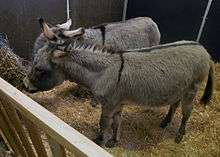Sardinian donkey
 | |
| Conservation status | FAO: endangered[1] |
|---|---|
| Other names | Molente, àinu, burriccu, poleddu, coccineddu, incherci, incónchinu, molinzanu, pegus de mola[2] |
| Country of origin | Italy |
| Distribution |
|
| Use |
|
| Traits | |
| Height |
|
| Classification | |
| MIPAAF | Breed standards |
| |

At pasture in Sardinia
The Sardinian donkey, Italian: Asino sardo, Sardinian: Molente/Molenti is a breed of donkey from the Mediterranean island of Sardinia, west of Italy.[3] It is raised throughout the island; there are also some small populations in mainland Italy.[4] It is one of the eight autochthonous donkey breeds of limited distribution recognised by the Ministero delle Politiche Agricole Alimentari e Forestali, the Italian ministry of agriculture and forestry.[5] The conservation status of the Sardinian donkey was listed as "endangered" by the FAO in 2007.[1]
References
- 1 2 Barbara Rischkowsky, D. Pilling (eds.) (2007). List of breeds documented in the Global Databank for Animal Genetic Resources, annex to The State of the World's Animal Genetic Resources for Food and Agriculture. Rome: Food and Agriculture Organization of the United Nations. ISBN 9789251057629. Accessed May 2014.
- ↑ Ditzionariu Sardu Unificadu, asino
- ↑ Breed data sheet: Asino Sardo. Domestic Animal Diversity Information System of the Food and Agriculture Organization of the United Nations. Accessed September 2013.
- ↑ Daniele Bigi, Alessio Zanon (2008). Atlante delle razze autoctone: Bovini, equini, ovicaprini, suini allevati in Italia (in Italian). Milan: Edagricole. ISBN 9788850652594. p. 172–73.
- ↑ Norme tecniche: Allegato 2 a D.M. 9742 del 7 maggio 2012 (in Italian). Ministero delle Politiche Agricole Alimentari e Forestali. p. 24. Accessed September 2013.
| Wikimedia Commons has media related to Asino Sardo. |
This article is issued from
Wikipedia.
The text is licensed under Creative Commons - Attribution - Sharealike.
Additional terms may apply for the media files.